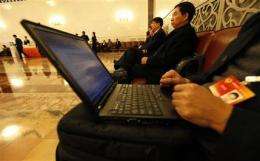China tries microblogging top political event

(AP) -- So this is how you get through China's biggest political event of the year: "Sit still, stare toward the front, pretend like you're looking but you're really not, pretend like you're listening but you're really not ... make your brain blank."
As delegates to the National People's Congress dip into the world of Twitter-like microblogging, the Chinese public is getting a rare glimpse inside the workings, and nonworkings, of power.
For the first time, some of the almost 3,000 delegates are posting brief online messages from behind the scenes as they shuttle between vast, largely immobile meetings and their hotels, sealed off from the public with police tape.
China's political workings are so controlled and opaque that some Chinese don't know who their delegates are. But some representatives are now being scrutinized, sucked into chats with netizens and even breaking news on the social network, where anyone can post notes of up to 140 characters and choose which people to "follow," or get updates from.
"Beauty Fashion" magazine publisher Zhang Xiaomei is a member of the NPC's sister advisory congress, also now meeting in Beijing. People digging into her microblog posts before the session started discovered her advice, above, on surviving meetings.
"When people in the meeting talk on and on, you can take the chance to make your mind and body more healthy," she wrote. "The longer the meeting is, the more you benefit."
But Zhang also posted a tidbit that Chinese state media picked up and shot through the online world.
"When delegates show up, they get a laptop computer. What's different this year is that they don't have to be returned when we're done," she wrote.
The offhand comment quickly turned into an investigation. Media and netizens estimated that free laptops for Zhang and her more than 2,000 colleagues would cost Chinese taxpayers about 10 million yuan (almost $1.5 million).
Angry editorials and blog posts about the need for clean government soon followed.
The microblogging experiment is the latest hesitant step for China, where the central government wants to stay on top of new technology but guide the message as well.
Twitter is blocked in China, and two popular China-based clones this month said they had shut down for good. The delegates are using a service by Internet portal operator Sina Corp., with the apparent blessing of the government.
"Microblogs meet the practicable needs of the masses and are in tune with the times of opposing cliches and nonsense," the Web site of the ruling Communist Party intoned last week.
Now the delegates just need to learn how to use them.
Ye Qing, the deputy director of the statistics bureau in the central province of Hubei, has seemed a bit rattled. When he mentioned his delegation would take photos with central government leaders, more than 50 responses blasted him, saying he was being paid to do more than that.
"These criticisms are reasonable," Ye replied. Other comments pointed out he had more than 24,000 followers but was following just two people.
"I only know what 'following' is after seeing these comments," Ye said. "I'm inexperienced. Sorry!"
Some have used the tool to push, 140 characters at a time, for reform.
Wang Dewei, a professor and a delegate from the eastern province of Shandong, microblogged about his proposal that government officials disclose their personal assets.
More than 50 other delegates signed the proposal, he said - a grouping almost certain to draw attention in China, where officials suspect anything that might be seen as a collective challenge.
Some of the signees were scared, saying, "If I speak too much for ordinary people, they might not make me a delegate again," Wang wrote.
The microblogging experiment might raise unrealistic expectations that delegates will become permanently more accessible, said Yiyi Lu, a Chinese politics expert and research fellow at the University of Nottingham.
"Once you start, you naturally have the demand that it be a regular thing," said Lu, who herself comes from Beijing but can't name a single delegate. "This raises expectations. And people who aren't doing it, others will ask, 'Well, why aren't you?'"
©2010 The Associated Press. All rights reserved. This material may not be published, broadcast, rewritten or redistributed.




















